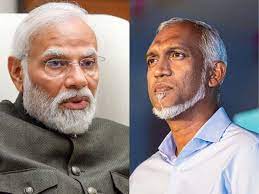NEW DELHI: India and the Maldives held formal talks on Sunday on the withdrawal of Indian troops from the island nation.
“Indian military personnel cannot stay in the Maldives beyond March 15. This is the policy of President Mohamed Muizzu and that of this administration,” said Abdulla Nazim Ibrahim from the Maldives President’s Office at a press conference on Sunday. Ibrahim made the statement after the first meeting of the India-Maldives Core Group in Male.
It was set up after a meeting between PM Narendra Modi and Maldives President Muizzu last month on the sidelines of the COP-28 conference in the UAE.
Ibrahim suggested that civilians from India could be allowed to operate the Indian aircraft deployed in the Maldives. A Ministry of External Affairs (MEA) statement made no mention of the March 15 demand but acknowledged that talks were held “on finding (a) mutually workable solution to enable continued operation of Indian military platforms that provide humanitarian and medvac services to the people of Maldives.”
The MEA said the two sides also discussed steps to “enhance the partnership”, including expediting the implementation of ongoing development cooperation projects. The Indian team included India’s envoy in Male Munu Mahawar and Joint Secretary in MEA for Indian Ocean affairs Puneet Agarwal. The Maldives team included President’s Chief of Staff Abdulla Fayaz and Maldivian envoy in India Ibrahim Shaheeb.
The Core Group talks were held a day after Muizzu returned from China and, without naming any country, had said: “We may be small, but that doesn’t give you the licence to bully us.” In China, he had signed 20 agreements and urged Beijing to send more tourists, presumably to make up for the cancellation of thousands of bookings by Indians after several Maldivian social media activists and three now-suspended junior ministers disparaged India and PM Modi.
The Maldives has also announced several other measures to forestall India using trade and health dependence as a lever. The government-owned health insurance service, Aasandha, will expand its coverage to include top hospitals in Thailand and Dubai. Currently, Aasandha services primarily cover hospitalisation in Indian hospitals.
An agreement with Turkey covers the supply of staple foods ordinarily sufficient for one year in addition to 10 per cent extra as a buffer.
Maldives also plans to import medicines from countries, including those in Europe, to reduce the current over-reliance on Indian pharmaceutical products.


